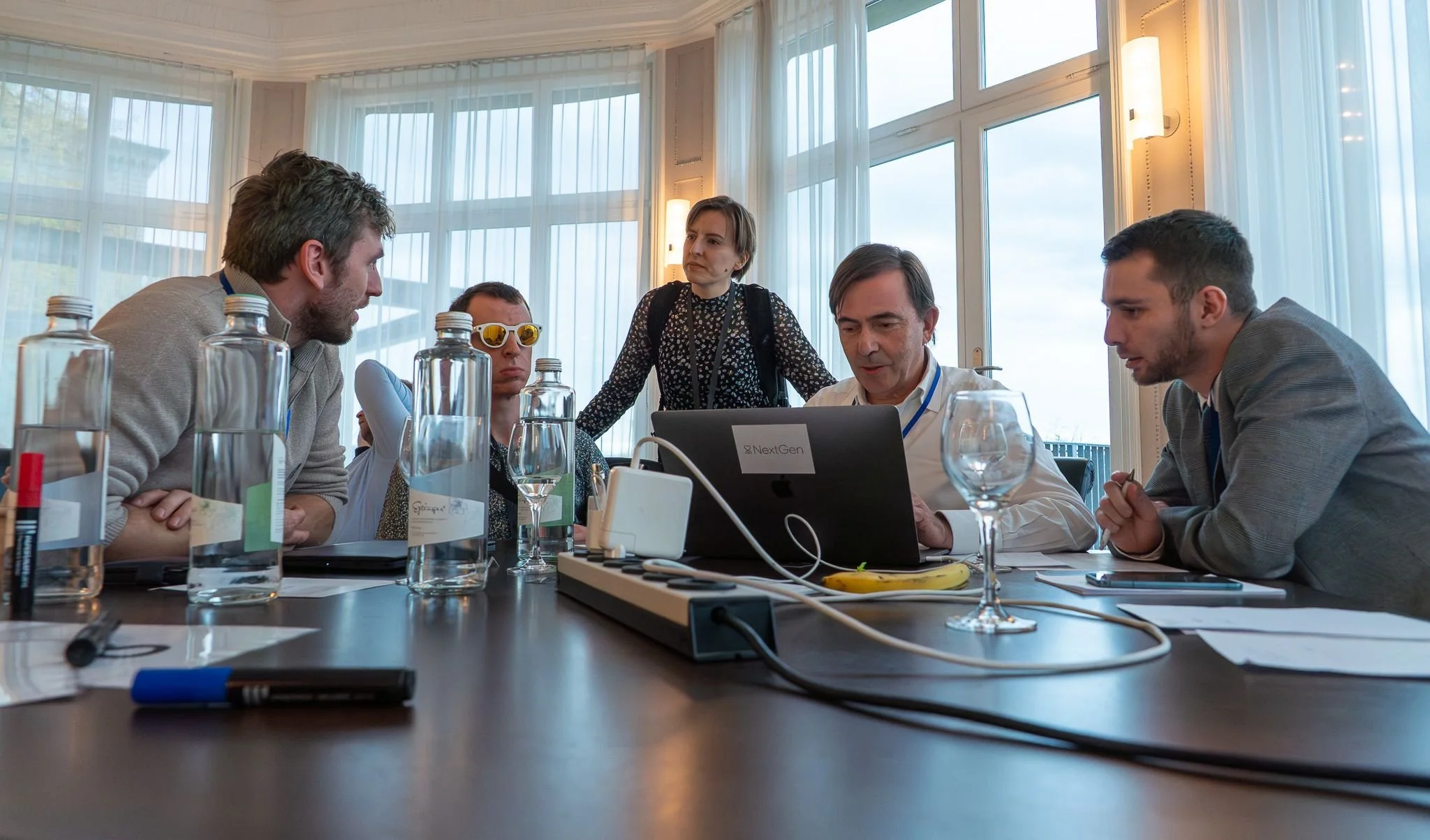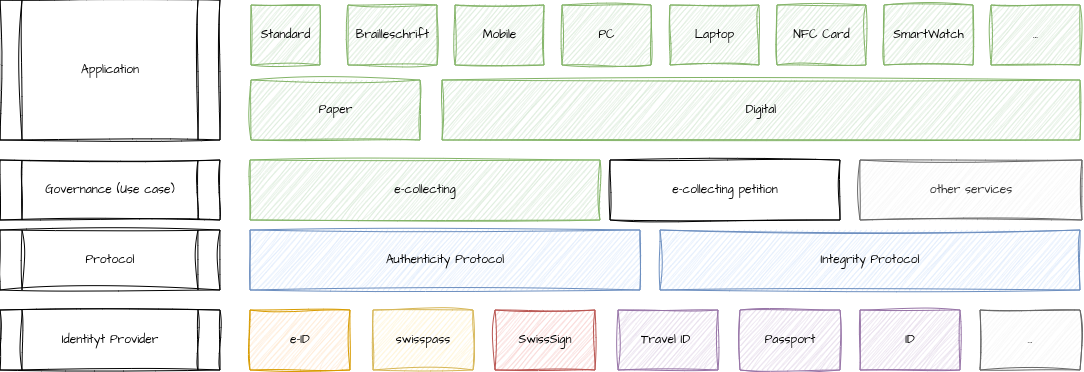Think Globally, Act Locally: HCF at the Intersection of Global Digital Governance and Local Implementation
Geneva, November 3rd 2025 — The participation of the Human Colossus Foundation in both an international and Swiss events underlines the necessity of new globally accessible protocols for digital authenticity and integrity.
1. Digital Transformation: Global Forces, Local Realities
Digital transformation is not a policy choice — it is a technological tide reshaping governance, democracy, and civic participation worldwide. Its impact is simultaneously global in scale (AI, data flows, platform power) and local in consequence (voter access, municipal infrastructure, cultural trust).
Last week, the Human Colossus Foundation’s participation in both the UNDP Global Conference on “New Ways of Governing” (Track 1: Governing Data & AI) and the Swiss “E-Collecting Hackathon” reflects a strategic positioning: to bridge the global discourse on digital sovereignty with the grounded, technical work of implementing democratic innovation at the national and municipal level.
2. Global Engagement: Shaping the Framework
On Oct. 28/29, at the UNDP conference in Oslo. The forum organised by the UNDP Global Policy Center for Governance the Foundation engaged with global thought leaders — from Indigenous data sovereignty advocates to EU regulators and Global South innovators — to help define what democratic digital governance looks like in a multipolar world. Key themes aligned with HCF’s mission:
New Ways of Governing: Track 1 : Governing Data & AI
Sovereignty as plural: Not state vs. tech, but hybrid models combining community control, technical design, and regulatory oversight.
Innovation at scale: Identifying pathways to move from projects to systemic change — a core challenge for HCF’s global network.
Governance through an ecosystem architecture: How data flows across independent sovereign partners, and interface design embed democratic values — or undermine them.
This global engagement ensures HCF contributes to — and is informed by — the emerging norms, frameworks, and political economies shaping digital governance worldwide.
3. Local Implementation: Trust Through Verifiability — “Trust But Verify” in Practice
On Oct. 31st and Nov. 1st in Bern, the Foundation brought its distinctive approach, coined Dynamic Data Economy (DDE), to the Swiss E-Collecting Hackathon: “Trust But Verify” — a design philosophy that ensures every participant can verify what concerns them, without needing to trust any single technological intermediary.
This is not just a slogan — it is an architectural principle applied consistently across scales:
🔹 Globally — In ecosystem design, DDE ensures that data flows, authentication, and consent mechanisms are transparent and auditable. No black boxes. No hidden intermediaries. Everyone — citizen, regulator, platform — can verify the authenticity and integrity of data flowing through the ecosystem.
🔹 Locally — In the Swiss e-collecting prototype, HCF advocated for paper/digital hybrid solutions where:
- Communes/Cantons can integrate in their systems softwares tools to help validate eligibility and produce encrypted authentic attestation without long term storing additional sensitive data.
- Committees, relying on the integrity of communes encrypted attestations, can compile initiatives or referendum for the Federal Chancellery without accessing voter identity. Real-time dashboard enables Committees to track the progress on verifired signatures.
- The Federal Chancellery can perform a second level control — through digital proofs, receipts, open APIs to secured registeries. Final decision on the acceptance of intitive or referandum to be backed by an auditable processes respecting the federal structure of Swiss democratic institutions. The problem we did not address during the hackathon is the essential ceremonial of depositing the boxes of signature form in Bern by the initative committee. Transfering a set of cryptographic key is less visual than a pile of boxes.
Dealing with accessibility with the representatives of the Incluthon Initiative that makes digital product available for people with disabilities
This is verifiable democracy: not just secure, not just private — but transparently accountable to all stakeholders. Trust must be earned, not assumed. The same underlying digital protocols that enable global data ecosystems also enable local voting systems.
Once the signature process is securely digitalised and harmonised with legacy systems, an enhanced form of participative democracy can emerge with new possibilities unavailable with solely paper based solution. During the hackathon, we discussed, for example, the possibilities that
Citizen can verify their signature was counted.
Swiss citizen abroad can participate as if they were in Switzerland, no time-lag.
Vision impaired persons are offered specific digital support with the same level of security without adding complexity to the communes, initiative committee or chancellery process
Tradition of signature in the street is kept and dedicated secured app for collecting agencies are developed
Extension of the system to cantonal petition without creating a separate infrastructure
Here is the “solution stack” we proposed to address the ten topics of the E-Collecting process.
For more information, connect to the E-Collecting website of the Swiss Chancellery for our report.
4. Synergy: From Global Discourse to Local Impact
The combination of these two events enables the Human Colossus Foundation to:
✅ Contribute to global vision — shaping how digital sovereignty, AI ethics, and participatory governance are defined — always through the lens of verifiability.
✅ Develop models locally — validating principles against real-world constraints in Switzerland’s federal, multilingual, and highly regulated context — with “Trust But Verify” as the anchor.
✅ Build bridges — between global policy, local governance, and technical implementation — creating feedback loops that make both levels stronger, more resilient, and more trustworthy.
This dual presence is not coincidental — it is strategic. Digital transformation cannot be governed from above or below alone. It requires actors who can operate across scales — and the Human Colossus Foundation is positioning itself as one of them, with a clear, consistent, and verifiable approach to building trust in digital systems.
Follow us through our different channels for more information.





